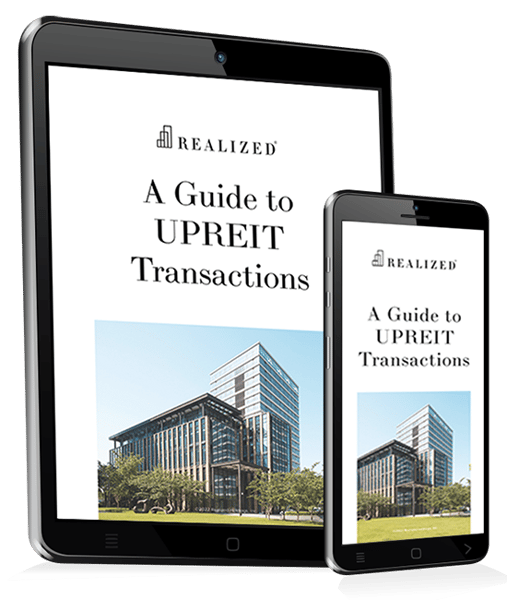Realized does not provide tax or legal advice. This material is not a substitute for seeking the advice of a qualified professional for your individual situation.
Costs associated with a real estate, or 1031 transaction may impact investor’s returns and may outweigh the tax benefits. An unfavorable tax ruling may cancel deferral of capital gains and result in immediate tax liabilities.
Diversification does not guarantee a profit or protect against a loss in a declining market. It is a method used to help manage investment risk.
Investors who have sold real estate and executed a 1031 Exchange into a DST may execute future 1031 Exchanges and continue to defer taxable gains. Alternatively, a client may enter into a transaction pursuant to IRS Code Section 721 (also known as an UPREIT transaction). In an UPREIT transaction, Clients will receive, at the REIT Sponsor’s option, cash or OP units. OP units are units of an operating partnership that is wholly owned by a REIT. If the client receives OP units, he or she has exchanged into a security and therefore no longer owns real estate and cannot execute another 1031 Exchange out of the OP units and into other real estate. However, pursuant to IRS Code Section 721, the UPREIT transaction into the OP units may qualify as a tax-deferred exchange. The disposition of their interest in OP units will result in a taxable transaction, including the recognition of their deferred capital gain and any depreciation recapture. The client’s gain will only be recognized upon sale or disposition of the OP units.
There is no guarantee that an UPREIT transaction will occur. The option for this transaction is at the discretion of the REIT Sponsor. Some DSTs allow the client to choose whether to take OP Units or cash. Clients should consult the prospectus and their advisor regarding the specifics.
A non-traded REIT is a security that invests in real estate directly, either through properties or mortgages and is not listed on securities exchanges. There are risks associated with these types of investments and include but are not limited to the following:
- Typically no secondary market exists. The securities are generally illiquid and even if a customer is able to sell the security, the price received may be less than the per share estimated value provided in the account statement
- Value of the shares in the trust will fluctuate with the portfolio of underlying real estate. There is no guarantee you will receive any income. Involves risks such as refinancing in the real estate industry, interest rates, availability of mortgage funds, operating expenses, cost of insurance, lease terminations, potential economic and regulatory changes. This is neither an offer to sell nor a solicitation or an offer to buy the securities described herein. The offering is made only by the Prospectus.
Holdings will generally be illiquid until which time they are converted to OP units. Even after exchanging into the OP units, repurchase of the OP units by the REIT Sponsor is at their discretion via their share repurchase plan which may be modified, suspended or terminated by the board of directors of the REIT at any time.

